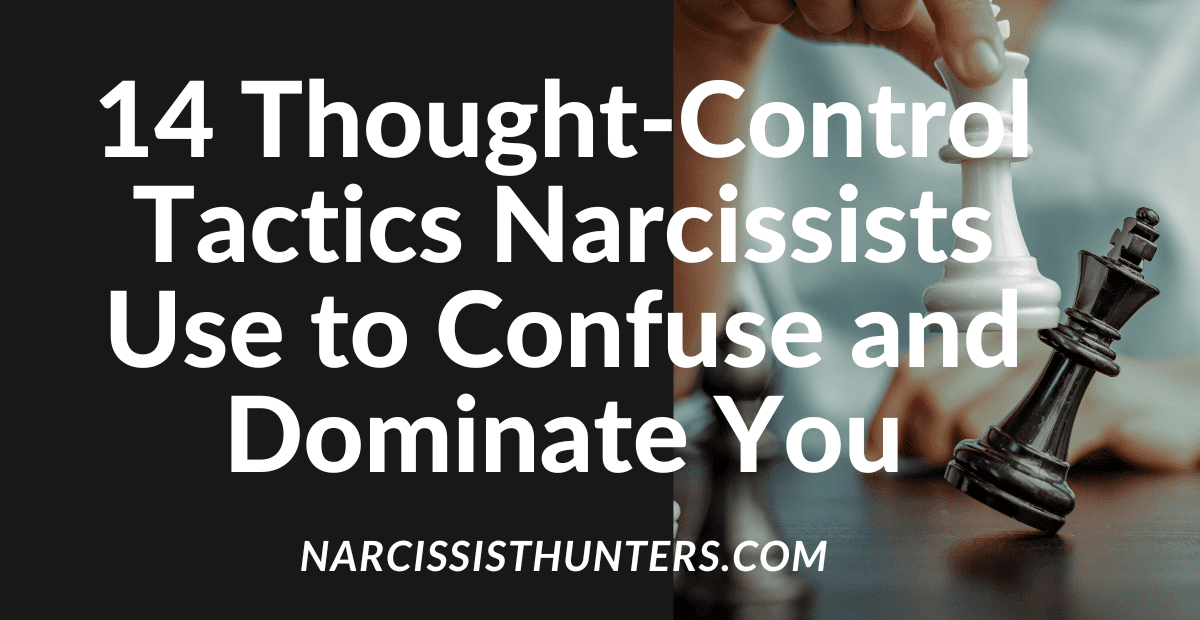Narcissists are known for their manipulative and controlling behavior, often using thought-control tactics to confuse and dominate their victims. These tactics can be difficult to recognize, leaving victims feeling powerless and trapped in the relationship.
In this blog post, I will outline 14 common thought-control tactics narcissists use, including gaslighting, projection, blame-shifting, and more. By understanding these tactics, you can better recognize the signs of narcissistic abuse and protect yourself from its damaging effects. Let’s dive in.
How Narcissists Control and Manipulate Their Victims?
Narcissists control and manipulate their victims to maintain their sense of superiority and to get what they want. They may use a combination of tactics to confuse and dominate their victims. These tactics can cause victims to question their own reality and feel trapped in the relationship.
1. Gaslighting
Gaslighting is a manipulative tactic used by narcissists to make their victims doubt their own memory, perception, or sanity. Narcissists may deny something they said or did, blame their victim for misremembering, or tell their victim that they are being too sensitive.
Read more: How Gaslighting works?
Examples of How Narcissists Use Gaslighting
- A narcissist tells their partner that they never said something hurtful, even though the partner clearly remembers the conversation.
- A narcissist accuses their partner of being paranoid or delusional when they question their behavior.
- A narcissist tells their partner that they are too sensitive and need to toughen up.
Read more: Gaslighting Examples in Narcissistic relationships
2. Projection
Projection is a defense mechanism used by narcissists to attribute their own thoughts, feelings, and behaviors to their victims. This tactic can confuse victims and make them question their own behavior and intentions.
Examples of How Narcissists Use Projection
- A narcissist accuses their partner of being selfish, even though the narcissist is the one who is self-absorbed.
- A narcissist accuses their partner of cheating, even though the narcissist is the one who is unfaithful.
- A narcissist accuses their partner of being controlling, even though the narcissist is the one who is manipulative.
3. Blame-shifting
Blame-shifting is a tactic used by narcissists to deflect responsibility for their own actions and behaviors onto their victims. This can cause victims to feel guilty or responsible for the narcissist’s behavior.
Examples of How Narcissists Use Blame-shifting
- A narcissist blames their partner for their own unhappiness or dissatisfaction.
- A narcissist blames their partner for their own mistakes or failures.
- A narcissist blames their partner for their own abusive behavior.
4. Smear Campaigns
A smear campaign is a tactic used by narcissists to damage their victim’s reputation or relationships with others. Narcissists may spread rumors, lies, or half-truths about their victim to isolate them and maintain control.
Examples of How Narcissists Use Smear Campaigns
- A narcissist spreads lies about their ex-partner to mutual friends to damage their reputation.
- A narcissist tells their partner’s family members that they are mentally unstable to isolate them from their support system.
- A narcissist spreads rumors about a co-worker to make themselves look better by comparison.
5. Triangulation
Triangulation is a tactic used by narcissists to create drama or competition between two or more people to maintain their control and boost their ego. Narcissists may use triangulation to make their victim feel jealous, insecure, or inferior.
Examples of How Narcissists Use Triangulation
- A narcissist flirts with their partner’s friend to make their partner jealous.
- A narcissist pits two friends against each.
other to create competition and maintain their control.
- A narcissist compares their partner unfavorably to someone else to make them feel inferior.
6. Intermittent Reinforcement
Intermittent reinforcement is a tactic used by narcissists to reward or punish their victim inconsistently. This can create an addictive cycle of hope and fear, causing the victim to stay in the relationship despite the abuse.
Examples of How Narcissists Use Intermittent Reinforcement
- A narcissist showers their partner with affection one day and ignores them the next.
- A narcissist alternates between compliments and insults to keep their victim off-balance.
- A narcissist gives their partner the silent treatment for days and then suddenly becomes affectionate again.
7. Love-bombing
Love-bombing is a tactic used by narcissists to overwhelm their victim with attention, affection, and gifts at the beginning of a relationship. This can make the victim feel special and loved, but it is often a manipulative tactic to gain control.
Examples of How Narcissists Use Love-bombing
- A narcissist buys their partner expensive gifts and showers them with attention in the early stages of a relationship.
- A narcissist sends constant texts and calls to their partner to make them feel wanted and desired.
- A narcissist talks about a future together very early on to create a sense of commitment and obligation.
8. Discarding and Hoovering
Discarding is a tactic used by narcissists to abruptly end a relationship, often without explanation or warning. Hoovering is when the narcissist tries to suck their victim back into the relationship after discarding them.
Examples of How Narcissists Use Discarding and Hoovering
- A narcissist abruptly ends a long-term relationship without explanation or warning.
- A narcissist tells their partner that they need space and disappears for weeks or months.
- A narcissist tries to get back together with their ex-partner after discarding them by sending gifts or making promises.
9. Silent Treatment
The silent treatment is a tactic used by narcissists to punish their victim by refusing to talk or interact with them. This can cause the victim to feel anxious, guilty, and confused.
Examples of How Narcissists Use Silent Treatment
- A narcissist refuses to talk to their partner for days or weeks after a disagreement.
- A narcissist gives their partner the silent treatment in public to embarrass or punish them.
- A narcissist ignores their partner’s attempts to reconcile or apologize.
10. Double Standards
Double standards are a tactic used by narcissists to hold their victim to a different set of rules or expectations than they hold themselves. This can cause the victim to feel confused, frustrated, and powerless.
Examples of How Narcissists Use Double Standards
- A narcissist demands that their partner be honest and loyal but lies and cheats themselves.
- A narcissist expects their partner to be understanding and forgiving but refuses to apologize or take responsibility themselves.
- A narcissist criticizes their partner’s behavior but does the same things themselves without consequence.
11. Emotional Blackmail
Emotional blackmail is a tactic used by narcissists to manipulate their victim by threatening to withdraw love, support, or attention unless their demands are met. This can cause the victim to feel guilty, responsible, and trapped.
Examples of How Narcissists Use Emotional Blackmail
- A narcissist threatens to end the relationship unless their partner does what they want.
- A narcissist tells their partner that they will hurt themselves if the partner leaves or doesn’t comply with their demands.
- A narcissist withholds affection or attention unless their partner does what they want.
12. Playing the Victim
Playing the victim is a tactic used by narcissists to shift blame or responsibility onto their victim and elicit sympathy or attention. This can cause the victim to feel guilty, responsible, and trapped
Examples of How Narcissists Play the Victim
- A narcissist blames their partner for their own mistakes or shortcomings.
- A narcissist tells a sob story about their difficult childhood or past relationships to gain sympathy and attention.
- A narcissist exaggerates their own suffering to make their partner feel guilty and responsible.
Gaslighting Worksheet: Reclaim Your Truth
Breaking Free from the Pleaser Trap: A People-Pleasing Worksheet
13. Verbal Abuse
Verbal abuse is a tactic used by narcissists to belittle, demean, and criticize their victim using words. This can cause the victim to feel ashamed, worthless, and powerless.
Examples of How Narcissists Use Verbal Abuse
- A narcissist calls their partner names or insults their appearance or intelligence.
- A narcissist uses sarcasm or mocking to belittle their partner’s opinions or feelings.
- A narcissist yells or screams at their partner to intimidate or control them.
14. Physical Abuse
Physical abuse is a tactic used by narcissists to exert control and intimidate their victim using physical force or violence. This can cause the victim to feel afraid, trapped, and powerless.
Examples of How Narcissists Use Physical Abuse
- A narcissist hits, slaps, or punches their partner during an argument or disagreement.
- A narcissist destroys property or throws objects at their partner to intimidate or scare them.
- A narcissist uses their size or strength to physically overpower or control their partner.
Final Thoughts
Narcissists use a variety of thought-control tactics to confuse and dominate their victims. These tactics can be difficult to recognize, especially if the victim is emotionally invested in the relationship.
It is important to be aware of these tactics and seek help if you or someone you know is experiencing narcissistic abuse. Recognizing and avoiding narcissistic abuse can help prevent long-term emotional and psychological damage.


